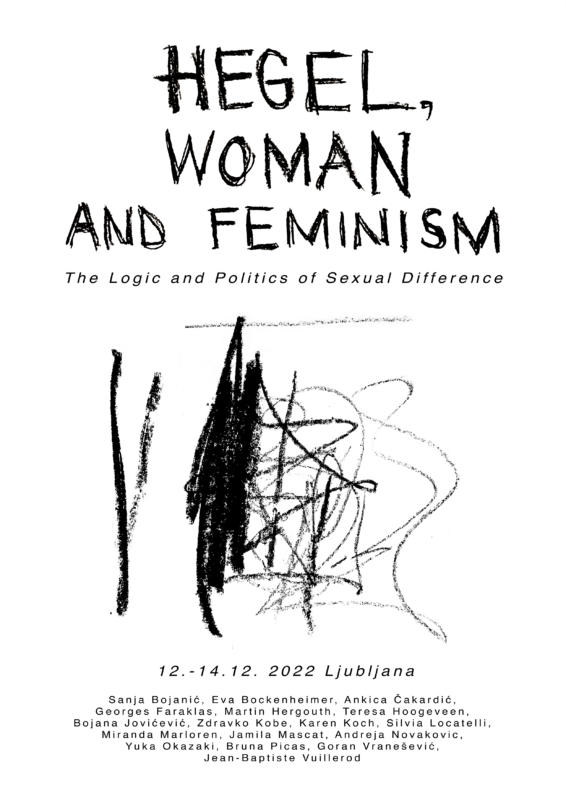We are glad to announce the conference Hegel, Woman and Feminism: The Logic and Politics of Sexual Difference. The event will take place at the University of Ljubljana (The Academy of Theatre, Radio, Film and Television, Aškerčeva 5) on 12th-14th December 2022.
The event is jointly organized by the Free University of Berlin, the University of Padua, the University of Ljubljana, the Slovenian Research Agency project Hegel’s Political Metaphysics, and the Goethe-Institut Ljubljana. The conference will continue within the framework of the forthcoming Hegel Congress, to be held in Stuttgart in 2023.
Organizing committee: Giulia Bernard (University of Padua), Dina Emundts (Free University of Berlin), Luca Illetterati (University of Padua), Bojana Jovićević (University of Ljubljana), Zdravko Kobe (University of Ljubljana), Karen Koch (Free University of Berlin), Goran Vranešević (University of Ljubljana).
The complete program of the event is available at this link.
Below you can find a brief presentation of the conference and a list of speakers.
***
Hegel, Woman and Feminism: The Logic and Politics of Sexual Difference
It is a widespread conviction that there are two instances in Hegel’s philosophical system where Hegel inevitably produces a contradiction he is unable to solve. The one concerns the rabble, the other the woman. While in the first case the common belief may be exaggerated, in the case of woman it is different. In the Elements of the Philosophy of Right Hegel notoriously claims that “the natural determinacy of the two sexes acquires an intellectual and ethical significance,” and concludes that, “. . . man has his actual substantial life in the state, in learning etc., . . . woman, however, has her substantial vocation in the family . . .” Today, this position is not only no longer feasible, but it is also easy to see that Hegel violated one of the major principles of his system of right as “the realm of actualized freedom”. As every individual has the “destiny to lead a universal life”, by confining women to the realm of the family, Hegel systematically prevented them from fully actualizing their freedom. And this is a blatant contradiction.
Many scholars tend to dismiss Hegel’s conceptual treatment of woman as a mere misapprehension, ultimately relying on the fact that Hegel, too, was a child of his time. Yet, we believe that such trivialization falls decisively short of the problem. On the one hand, there seem to be systematic reasons why Hegel’s account of the question of woman and sexual difference is highly problematic, to put it mildly. There are numerous passages in Hegel’s work supporting the thesis that woman is, indeed, in the conceptual sense, inferior to man, most notably regarding her relation to social norms and the structural role she plays in social reproduction. More precisely, woman reproduces the dominant social conditions and mechanisms, but is unable to create new ones. On the other hand, there are thought figures such as Antigone, who revolt against the prevalent societal patterns and roles ascribed in a specific society, thus opposing the picture Hegel draws of woman elsewhere. The question is, how does this conceptual tension and even Hegel’s explicit conceptual exclusion of woman relate to his system of thought as such? And is it possible to resolve this problem within the boundaries of Hegel’s system or are we obliged to go beyond it and let Hegel go?
The aim of our conference is to articulate these questions more clearly, and offer possible solutions to the problem.
The speakers are:
- Sanja Bojanić (University of Rijeka)
- Eva Bockenheimer
- Ankica Čakardić (University of Zagreb)
- Georges Faraklas (University of Athens)
- Martin Hergouth (University of Ljubljana)
- Teresa Hoogeveen González (University of Barcelona)
- Luca Illetterati (University of Padua)
- Bojana Jovićević (University of Ljubljana)
- Zdravko Kobe (University of Ljubljana)
- Karen Koch (Free University of Berlin)
- Silvia Locatelli (University of Lisbon)
- Jamila Mascat (Utrecht University)
- Andreja Novakovic (University of California, Berkeley)
- Yuka Okazaki (Kyoto University)
- Bruna Picas Prats (University of Barcelona)
- Goran Vranešević (University of Ljubljana)
- Jean-Baptiste Vuillerod (Paris Nanterre University)
For further information, please visit the website of the conference.

